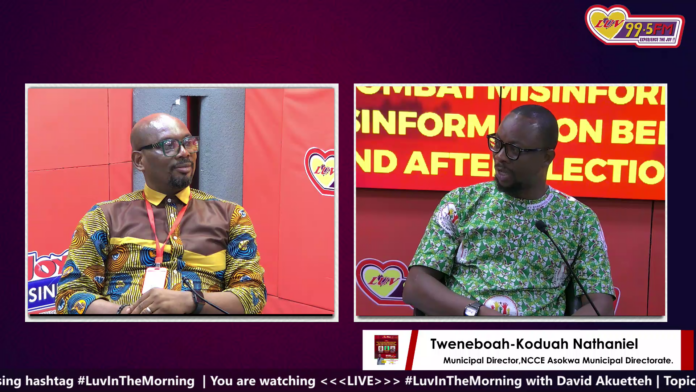The National Commission for Civic Education is distraught over the influx of misinformation and disinformation on the general election, with barely two weeks for the country to hit the polls.
Their worry follows a misleading comment made by a broadcaster on Wontumi TV claiming different dates have been scheduled for the election.
The Municipal Director of the National Commission for Civic Education (NCCE) in the Asokwa Municipality, Nathaniel Tweneboah Koduah, expressed his concerns about misinformation and disinformation being propagated in the media ahead of the upcoming elections.
Speaking on Luv FM, he described it as depressing, to hear a media personality spreading false information about the electoral process.
Tweneboah Koduah noted that he and his team have been working tirelessly since the beginning of the year to battle misinformation and disinformation, focusing on four critical areas,vote buying, misinformation and disinformation, religious and ethnic violence, and political violence.
“We have carried out extensive education on these four areas, particularly on misinformation and disinformation, and continue to do so. It’s disheartening to hear a media personality make such misleading statements,” he stated.
Contributing to the discussion on Luv in the Morning, a member of the NPP Ashanti Regional Communication Team, Archibald Gyasi, argued that the public is already well-informed about the electoral process through the outreach efforts of political parties in rural areas.
“What the media personality said isn’t something that will mislead the public. People know how elections work,” he said,
although he emphasized that he does not condone misinformation.
“I think this is selective justice, even though I don’t support media professionals misleading the public about elections” he added.
Prof Dissou Yarhands of the National Democratic Congress, however, took a swipe at the NPP for not condemning the comment.
Tweneboah Koduah remains committed to battling misinformation and emphasized the need for responsible communication, especially during an election period. He called on political parties and the media to be mindful of their statements to ensure the public remains informed and to safeguard the peace and integrity of the electoral process.
The commission says such comments disrupt their work and jeopardize public trust in credible institutions.
Mr. Koduah stressed the dangers of misinformation to Ghana’s democracy, warning that such actions devastate trust in institutions and leadership, and also fuel social unrest, and distract from critical national issues.
“The NCCE’s efforts to educate the public are being undermined by such false statements. The priority is to ensure a peaceful election and reduce the number of rejected ballot papers. Statements like these can have serious consequences for the notion,” he said.
He highlighted the difficulties this creates, especially when such comments come from high profile individuals who influence public opinion.
“I’m glad the NCCE national headquarters has condemned this misinformation.We’ve engaged media houses on the consequences of spreading false information, but I’ve not formally written to the media house involved. The press release we’ve issued have address this,” he stated

